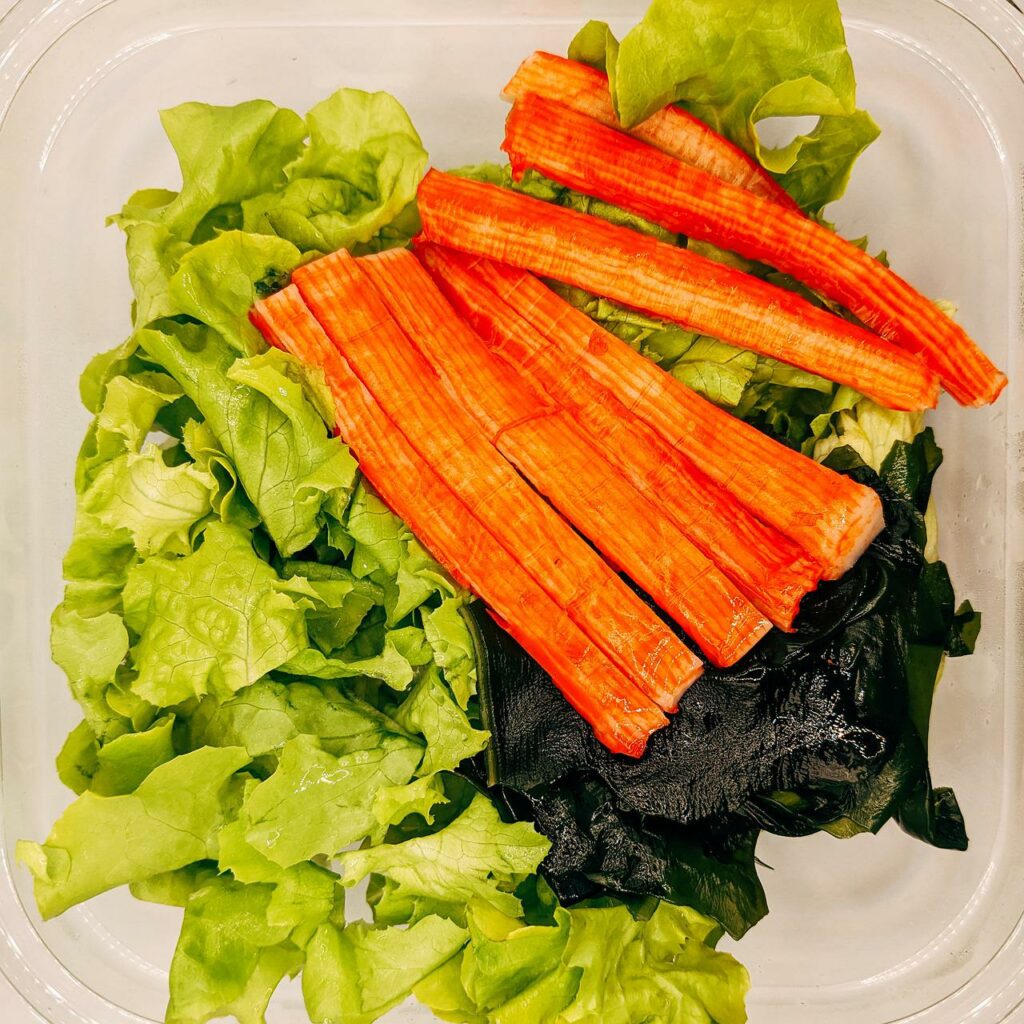We all can’t help but treat our dogs to the occasional snack.
After all, they’re part of the family.
However, one little additive such as imitation crab can throw your dog’s whole system out of whack.
That’s why it’s paramount to know if this meat is safe for them.
Despite all precautions, sometimes we mistakenly let something slip by that isn’t suitable for our pups.
So, can dogs have imitation crab?
Yes, dogs can eat small quantities of imitation crab.
However, large amounts of it can cause real problems.
Imitation crab typically contains added sugar, salt, monosodium glutamate (MSG), and artificial food dye.
These things are terrible for your dog and could cause many health issues if ingested in large quantities.
For example, too much imitation crab can cause pancreatitis or kidney failure in your dog.
This article investigates whether imitation crab is safe for dogs to consume and its potential benefits and risks to them.

Is Imitation Crab Safe for Dogs to Eat?
Imitation crab is safe for your dog in small quantities occasionally.
When you feed a dog too much imitation crab over a long period, it might become sick.
For instance, it may cause gastrointestinal problems for your dog, resulting in vomiting and diarrhea.
If your dog gets a hankering for some crab meat, try giving them some real seafood.
Salmon and tuna are excellent sources of protein.
Avoid giving them imitation crab cooked in butter or oils.
These ingredients aren’t good for dogs.
Butter and oil can cause diarrhea, vomiting, and other gastrointestinal issues.
Some varieties of imitation crab have artificial sweeteners and preservatives that could make dogs sick.
So even if your dog loves imitation crab, only give him small amounts as an occasional treat rather than part of his regular diet.

Why Can’t Dogs Have Too Much Imitation Crab?
Imitation crab comes from a combination of fish, starch, and salt.
So if your dog eats a lot of it at once, they are in danger of getting severe salt poisoning.
If left untreated too long, your dog could die.
Symptoms include seizures, vomiting, diarrhea, and excessive thirst and urination.
A small amount of salt can help to prevent kidney stones and improve a dog’s appetite.
Still, an excessive salt intake may cause other health problems, including high blood pressure, a risk factor for heart disease.
Also, imitation crab might contain bad fat content like BHA, which is harmful to your dog’s health.
Imitation crab meat contains many ingredients that might be harmful to dogs.
These include indigestible raw starch, flavor enhancers, and vegetable oil which produce pancreatitis and lead to obesity in dogs.
Some types of imitation crab contain monosodium glutamate (MSG), which can disrupt the nervous system and cause other problems if your pup consumes it.
Potassium chloride is a compound used to substitute salt in imitation crab.
While it seems to balance the salt content, large amounts of potassium chloride can lead to nausea and vomiting in your pup.
If your dog eats imitation crab in large quantities, take them to the vet immediately.
Benefits of Imitation Crab for Dogs
If you’re looking for something to add a little variety to your dog’s diet, consider feeding him some imitation crab meat.
The health benefits of this meat for dogs are plentiful.
For instance, it contains protein, omega-3 fatty acids, and selenium, a mineral that helps your pup maintain healthy skin, bones, liver, and muscles.
The iodine found in this meat helps keep your dog’s thyroid healthy.
The copper found in this seafood treats doggy anemia (a deficiency of red blood cells).
Also, it helps keep your dog’s digestive tract healthy and functioning properly.
Dogs love the taste, too.
It’s a great way to get finicky pups to eat their veggies.
Ensure to introduce it slowly and only feed your pup small quantities at first to see how he reacts.
It’s even a yummy way to get extra vitamins into your pup’s diet.
The Risks of Feeding Dogs Imitation Crab
A small amount of imitation crab meat is healthy food for dogs, but there are some risks.
It contains ground-up fish molded into a paste and then shaped into a crab leg.
This food is intended to be light on the stomach, but some dogs may react badly.
The worst part of imitation crab meat is its high sodium and sugar levels.
This combination can lead to rapid weight gain, resulting in diabetes, heart disease, and liver failure.
If your dog gains 15 pounds in one week, immediately take him to the vet.
In some dogs, eating imitation crab can result in swollen eyes and rashes.
It’s not just the surimi that can cause your dog to be allergic to imitation crab meat.
The preservatives and food coloring added to it can also cause allergies.
These can lead to an upset stomach for your dog.
It is best to stay away from this kind of food if your dog is allergic to seafood.
Double-check the label if you’re using imitation crab as a treat for your pup.
Look for preservatives like sodium metabisulfite, a common additive known for causing allergies in humans and dogs.
While some protein is suitable for your dog, too much can cause kidney failure.
This is because the protein in imitation crab meat is not digestible by dogs.
It’s meant for humans who can break it down while dogs are not.
Closely monitor your dog’s eating habits and ensure he doesn’t overeat at once to avoid problems with imitation crab.
If it overeats, call the vet to see if treatment is necessary.
How Much Imitation Crab Can I Feed My Dog?
Please provide them with a piece about the size of one of your fingernails.
Feel free to give them as a snack or mix it into their food as a topping.
Conclusion
Dogs can crave imitation crab meat in large amounts with the same intensity as other food items.
A small amount of imitation crab meat is unlikely to cause any health problems for your dog.
Then again, after eating more than that amount, he might suffer from unpleasant side effects.
If your dog consumes large amounts of it, contact the veterinarian for advice immediately.
- What Dog Breeds Have Pink Skin? - March 24, 2023
- What Are the Most Inspiring Dog Breeding Quotes? - March 20, 2023
- Can Pheromone Spray Help Improve Dog Breeding Results? - March 19, 2023








